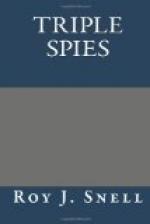JOHNNY’S FREE-FOR-ALL
Johnny smiled as he sat before his igloo. Two signs of spring pleased him. Some tiny icicles had formed on the cliff above him, telling of the first thaw. An aged Chukche, toothless, and blind, had unwrapped his long-stemmed pipe to smoke in the sunshine.
Johnny had seen the old man before and liked him. He was cheerful and interesting to talk to.
“See that old man there?” he asked Hanada, whom he still called Iyok-ok when speaking to him. “Communism isn’t so bad for him after all.”
Hanada squinted at him curiously without speaking.
“Of course, you know,” said Johnny, “what these people have here is the communal form of government, or the tribal form. Everything belongs to the tribe. They own it in common. If I kill a white bear, a walrus or a reindeer, it doesn’t all go in my storehouse. I pass it round. It goes to the tribe. So does every other form of wealth they have. Nothing belongs to anyone. Everything belongs to everybody. So, when my old friend gets too old to hunt, fish or mend nets, he basks in the sun and needn’t worry about anything at all. Pretty soft. Perhaps our friend the Russian is not so far wrong after all if he’s a communist.”
“Uh-hu,” the Jap grunted; then he exclaimed, “That reminds me, Terogloona, the Chukche who lives three doors from here, asked me to tell you to stay out of his igloo this afternoon.”
“Why?”
The Jap merely shrugged his shoulders.
“I have a way of doing what I am told not to, you should—” Johnny was about to say, “you should know that,” but checked himself in time.
“Better not go,” warned Hanada as he turned away.
After an early noon lunch Johnny strolled up the hill top. He wanted to get a view of the Strait. On particularly clear days, Cape Prince of Wales on the American side of Behring Strait can be seen from East Cape in Siberia. This day was clear, and, as Johnny climbed, he saw more and more of the peak as it lay across the Strait, above the white ice floes.
With trembling fingers he drew a one dollar bill from his pocket and spread it on his knee.
“There it is,” he whispered. “There’s the place where you came from, little old one-spot. And I am going to take you back there. The Wandering Jew once stood here and saw his sweetheart in a mirage on the other side. He was afraid to cross. But he only had a sweetheart to call him. We’ve got that and a lot more. We’ve got a country calling us, the brightest, the best country on the map. And we dare try to go back. Once that dark line of water disappears we’ll be going.”
Then questions began to crowd his brain. Would Hanada attempt the Strait at this time? What was his game anyway? Was he a member of the Japanese secret service detailed to follow the Russian, or was he traveling of his own accord? Except by special arrangement Japanese might not come to America. Was Hanada sneaking back this way? It did not seem like him. Perhaps he would not cross at all.




